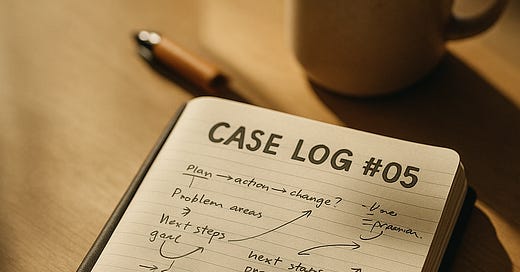Quiet Rebellion Caselog #05: The Exhausted Engine
Notes from the field. Profiles of high performers on the edge of their Rebellion.
Start Here
This series is a collection of real-world patterns I’ve witnessed again and again in my coaching practice.
Each entry in the Quiet Rebellion Caselog highlights one of the ways high performers adapt to survive success—especially inside systems that reward over-functioning, perfectionism, and people-pleasing.
These aren’t diagnoses. They’re deeply learned survival strategies. They work, until they don’t.
This series is for the ones who are tired of holding it all together. The ones who feel stuck, but can’t justify slowing down. The ones who’ve succeeded by every metric except the ones that matter.
If you’ve ever asked yourself, “Why does this still not feel like enough?” You’re in the right place.
Case 05: The Exhausted Engine
When burnout becomes a badge of honor.
They’re the ones who keep going.
Who wake up early, squeeze in the extra call, say yes when they mean maybe.
They’re productive. Relentlessly so. Even their downtime is optimized.
They check all the boxes. Hit all the goals. Stay one step ahead. And the world rewards them for it.
But inside? They’re tired in a way sleep doesn’t fix.
This is what I call The Exhausted Engine.
They’re not lazy. They’re over-revved.
Somewhere along the way, they fused their identity to their pace. Slowing down feels like failure. Rest feels like quitting.
So they keep going. Even when the joy is gone. Even when their body is begging them to stop.
They’ve been in fifth gear for so long they can’t even remember what it felt like to idle.
They tell themselves: “If I just get through this week, it’ll get better.”
“Everyone else seems to be managing.”
“I can rest after the launch, the quarter, the next round of funding.”
But the finish line keeps moving. And they keep burning fuel they don’t have.
What’s quietly devastating is this: They’ve forgotten what it feels like to want something. They’re running on obligation and fear, not inspiration or purpose.
Their quiet rebellion begins when they stop asking, “What’s next?”
And start asking, “What’s actually mine to do?”
Pause here for a moment
What are you postponing in the name of productivity?
What might return if you gave yourself permission to rest before collapse?
If this sounds like you (or someone you manage)
Some of us learned to equate speed with success.
We thought the pace was proof we were doing it right.
But the cost adds up.
If this feels familiar, or you lead someone who lives like this, here’s what helps:
Start noticing your energy, not just your calendar
Rest without needing to justify it
Build micro-pauses into your day, even if it’s 60 seconds
Ask yourself: Is this momentum or compulsion?
This isn’t about doing nothing.
It’s about doing less of what depletes you.
You’re not lazy for needing rest.
You’re just done outsourcing your worth to your output.
You don’t have to burn out to prove you matter.
You just have to choose a different pace.
New to the Quiet Rebellion?
If you missed the earlier entries Caselog #04: The Overthinker examines how clarity becomes a substitute for courage
Coming up next: Caselog #06, where we meet the Resistant Seeker - the high performer who wants change, but doesn’t quite trust it yet.
Subscribe below to receive all of the upcoming Caselogs, Field Manuals and other Dispatches from the Quiet Rebellion
Want to explore this further?
Book a Clarity Call if you're tired of running on fumes.
[Take the Quiet Rebellion Archetype Quiz] (coming soon)
In solidarity ✊
Nicholas Whitaker
Human BE-ing and Conscious Leadership Coach @ nicholaswhitaker.com
Co-founder @ Changing Work
Subscribe to my Quiet Rebellion mailing list to be first to hear about
new programs and upcoming retreats.
Follow me on LinkedIn, BlueSky, Substack Notes



